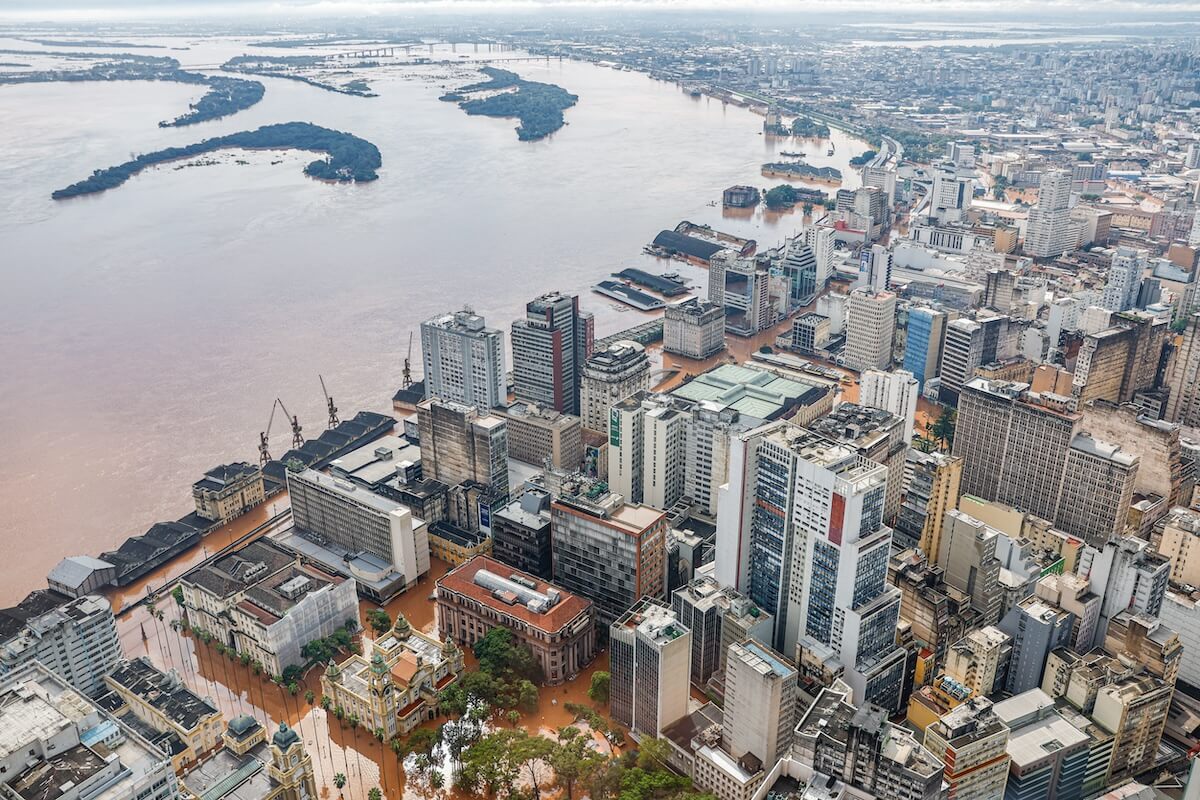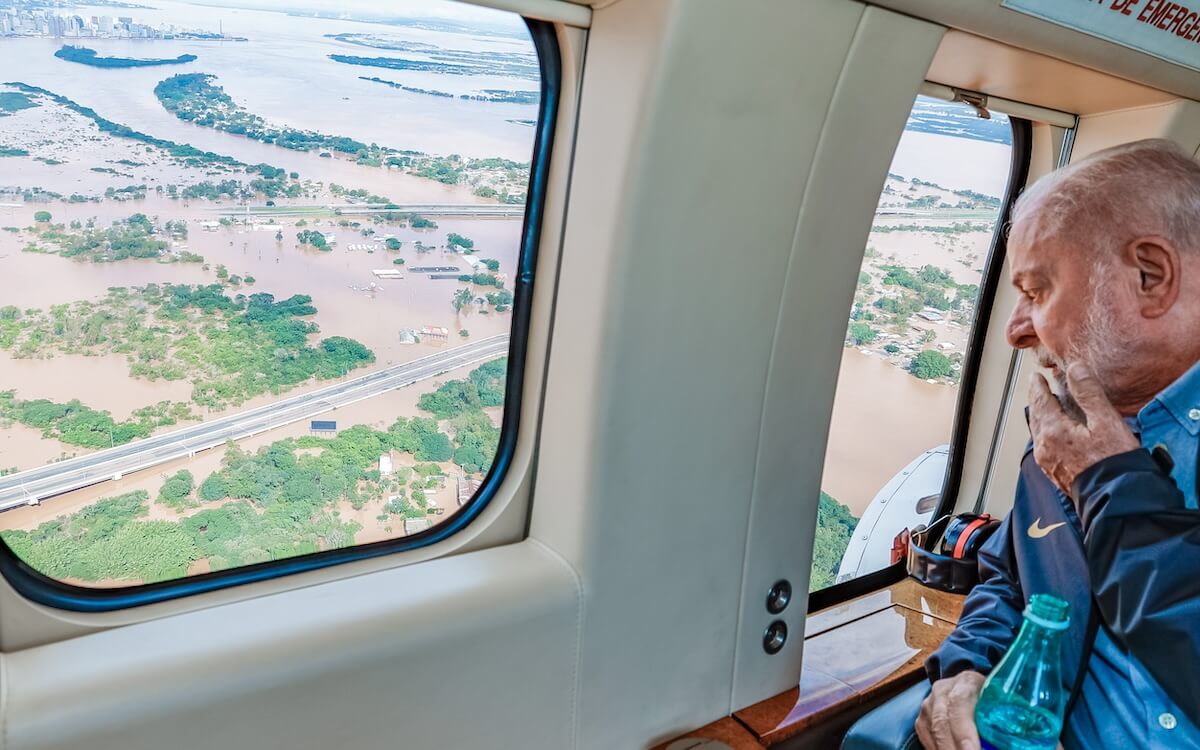The forum of the world's largest economies is a platform to discuss investments and strategies for addressing the impacts of climate change. Brasil is facing devastating floods in the state of Rio Grande do Sul. Other G20 countries have also been affected by storms caused by extreme weather conditions.

Faced with extreme weather events that hit developing nations hardest, the G20 has been discussing ways to combine the economic growth of member countries with actions to prevent, mitigate, and adapt to climate crises. The Brazilian state of Rio Grande do Sul was hit by atypical rainfall and flooding impacting 345 of the state's 496 municipalities. As of Monday (06), at least 850,000 people have been affected, according to estimates by the Brazilian Civil Defense.
Canada, Russia, Australia, Argentina, Germany, France, England, and East African countries including Somalia, Rwanda, and Tanzania have recently been affected by floods caused by extreme weather conditions, possibly associated with the El Niño phenomenon. Experts elucidate that the El Niño causes ocean waters to warm, triggering increased condensation and subsequent rises in both rainfall and sea levels. This elevation in sea levels can lead to river overflow, while the heightened condensation also tends to intensify the frequency and strength of storms.
Canada, Russia, Australia, Argentina, Germany, France, England, and East African countries including Somalia, Rwanda, and Tanzania have recently been affected by floods caused by extreme weather conditions, possibly associated with the El Niño phenomenon.
G20 against climate change
As a demonstration of leading by example, Brazil's G20 Presidency has prioritized increasing investment in addressing the global climate crisis, with a central focus on combating inequalities. Alongside the Climate Change Task Force, working groups such as Disaster Risk, Environmental and Climate Sustainability, and Infrastructure and Development are actively deliberating measures to enable member countries to mitigate risks and translate resources into impactful environmental and climate protection initiatives.
The G20 nations collectively represent 80% of the global GDP and are responsible for approximately 80% of the world's pollution gas emissions. André Aranha Corrêa do Lago, Secretary for Climate, Energy, and the Environment at the Brazilian Ministry of Foreign Affairs, underscores that the ramifications of rising temperatures are universally detrimental, with Brasil particularly vulnerable due to severe impacts on natural rainfall patterns.
Hence, the G20 presidency is dedicated to deliberating actions that can effectively advance the objective of limiting the planet's average temperature increase to 1.5ºC, as stipulated by the Paris Agreement and reaffirmed at COP28 in Dubai. "There is an effort within the G20 to coordinate various ministries, both in Brasil and abroad, and adopt a consistent stance regarding the threats and opportunities posed by the effects of climate change," emphasized Ambassador Corrêa do Lago.
"We made a point of bringing financing into the adaptation debate since mitigation is much more advanced. It means recognizing that adaptation is already a reality in people's and countries' day-to-day, both in national budgets and external financing. The G20 has the leadership to think about how we can move forward, specifically in terms of funding for adaptation and new instruments focused on the oceans," pointed out Ana Toni, National Secretary for Climate Change at Brasil's Ministry of the Environment (MMA).
The Secretary for International Affairs at the Brazilian Ministry of Finance and coordinator of the Finance Track, Tatiana Rosito, argued that efforts to tackle the situation must readjust the international financial system to mobilize public and private financial resources, particularly in developing countries. "This means rethinking the role of the State and the different countries in the call to action to combat climate change and also debating how to face up to the call to action in terms of mobilizing financial resources," she stated.
According to Marcelo Aragão, deputy head of the International Affairs Department at Brasil's Banco Central (Central Bank), the effects of climate change are perceived as an additional risk element for the economy. He argued that the G20 central banks understood a decade ago that the financial system is an instrument for reducing this risk. "Considering where to invest and how to prioritize the resources that are already insufficient is key. We have been working in partnership, internally and externally, in this relationship network that is the G20, trying to find solutions and ways to mobilize efforts towards the common goal of mitigating the effects of climate change," he said.
Climate and inequalities
According to Guilherme Simões, Secretary for the Peripheries at Brasil's Ministry of Cities, tackling the world's climate emergency without tackling socio-economic inequalities and their causes is impossible. That is why the issue is central to debates on disaster reduction.
"The first priority of Brasil's G20 Presidency was to combat inequalities and reduce vulnerabilities. In Brazil, we recognize that those who live with the potential for suffering or loss due to disasters typically reside in vulnerable areas, such as urban peripheries, slums, or precarious locations lacking adequate infrastructure. The international community warmly embraces our prioritization of this issue," stated Simões.







